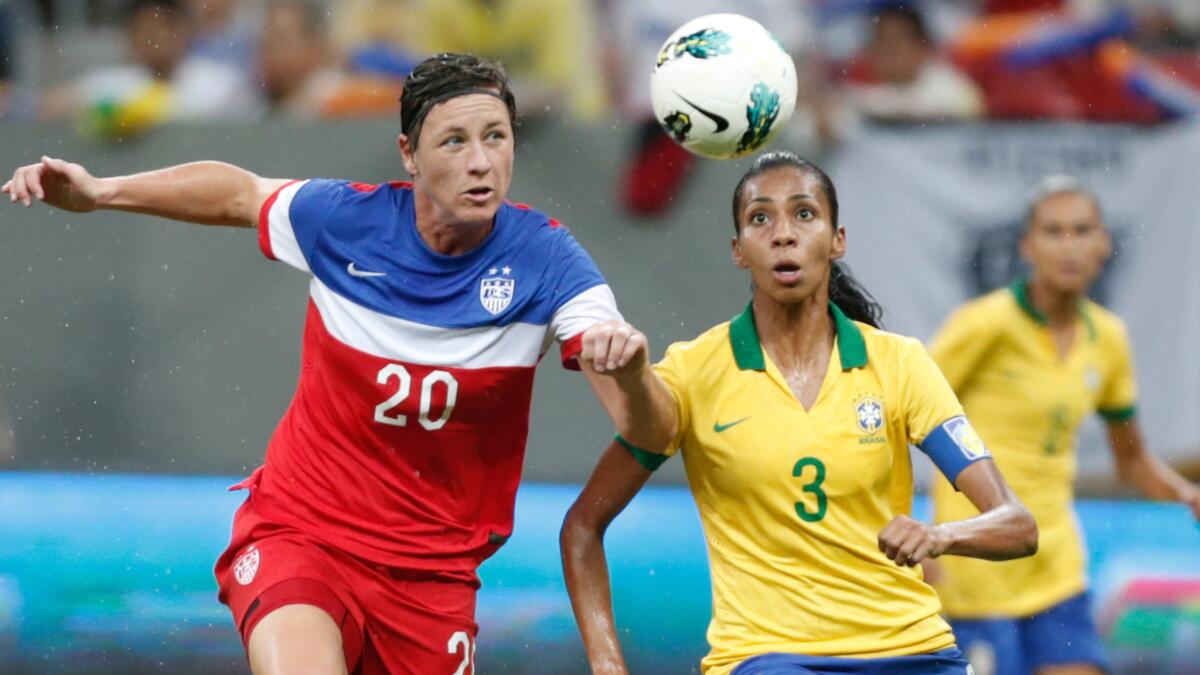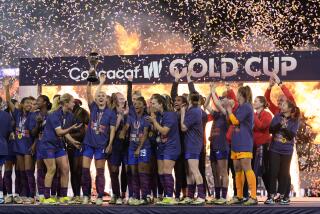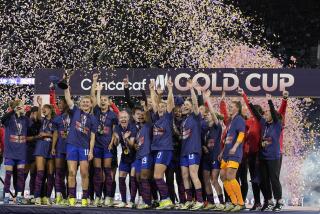In 2015, U.S. women face World Cup hurdle, Robbie Keane needed in L.A.

The U.S. women will try to give Abby Wambach, 34, a World Cup title before she retires, the Galaxy will try life without Landon Donovan for the first time in a decade and U.S. men’s national team Coach Juergen Klinsmann will try not to continue making enemies by speaking his mind and looking for players everywhere but at home (spoiler alert: he looks in Germany a lot).
Compelling story lines all for what figures to be a trying 2015 in U.S. soccer. But a year after tens of thousands of Americans flocked to Brazil to watch the World Cup in person and a record 26 million more watched the final at home, the goal for soccer in the new year won’t be to continue that growth but rather to avoid sliding too far in the other direction.
The European leagues and many TV networks are betting the U.S. sticks with soccer. Germany’s Bundesliga league even opened a marketing office in New York, and ESPN, NBC, beIN Sport, Univision, Fox and other networks have agreed, time and again, to pay ever more exorbitant prices to televise games from Europe and Latin America.
Here’s a look at what to expect in soccer in the new year:
What challenges face the U.S. women’s team in next summer’s World Cup in Canada?
The U.S. was drawn into the strongest of the tournament’s six four-team groups. The top-ranked Americans are paired with No. 5 Sweden, No. 10 Australia and Nigeria, Africa’s best women’s team. Sweden beat the U.S. in group play four years ago and will be stronger this time since Pia Sundhage, who coached the Americans to two Olympic championships, is now in charge of the Swedish program.
Then there’s also the matter of the playing surface. FIFA, global soccer’s governing body, says this will be the first World Cup played on artificial turf, something a growing coalition of women’s players — led by U.S. stars Wambach and Alex Morgan — is challenging before the Human Rights Tribunal of Ontario.
Can the Galaxy keep winning without Donovan?
Absolutely. But whether it can keep winning without Robbie Keane is another matter. Donovan was largely inconsistent throughout much of last season. Keane, however, was dominant all year, setting career Major League Soccer bests in goals (19) and assists (14) en route to the league’s most-valuable-player award. Keane has recently given hints that he is rethinking his return to MLS next year, though the Galaxy, which has Keane signed for another year, is confident he’ll be back.
Is the European trend toward super clubs good for the sport?
It is if you’re a fan of those clubs. But the consolidation of talent on the rosters of Real Madrid, Barcelona, Bayern Munich and Paris Saint-Germain had wiped out any sense of parity in Spain, Germany and France. When Atletico Madrid captured La Liga last year it ended a streak that had seen Real Madrid and Barcelona combine to win the last nine titles. And Real Madrid and Barcelona currently are 1-2.
Munich is unbeaten in its first 17 matches in the Bundesliga, a league it has won each of the last two seasons. And Paris Saint-Germain is well positioned to win its third consecutive French title. UEFA, the governing body for European soccer, has tried to level the playing field with its Financial Fair Play guidelines. But proof of how ineffectual that plan has been was demonstrated when Manchester United went on a record spending spree of $235 million during the summer transfer window while Barcelona paid $117 million to add Luis Suarez to team that already includes Lionel Messi and Neymar, and Real Madrid spent $100 million to pair James Rodriguez with Cristiano Ronaldo and Gareth Bale.
What happened to the World Cup bounce in the U.S.?
Well, if you’re talking about the TV bounce, it continued through the MLS Cup final, which drew nearly 2 million combined viewers on four platforms, a 93% jump over the audience for last year’s final. And NBC’s ratings for its coverage of the English Premier League is also up.
It’s easy to assume — but difficult to prove — that many viewers simply stayed with soccer after last summer’s World Cup, which also broke viewership records in the U.S. For men’s soccer there will no such draw this summer since the biggest tournament is the CONCACAF Gold Cup, typically a snore-fest on TV. And MLS, which recently signed a record eight-year TV deal, will have trouble maintaining its audience growth without the drama of Donovan’s long goodbye. So it will be up to the women’s World Cup and the mostly uncompetitive European leagues to keep people watching.
Is this the year Klinsmann and MLS Commissioner Don Garber become friends?
No. Since taking over the U.S. national team four years ago, Klinsmann has repeatedly questioned the quality of the MLS and its players. And Garber has repeatedly fought back, defending the league and its players. But each man is doing exactly what he was hired to do. Klinsmann’s job is to put together the best team he can and if he feels playing in MLS will not prepare his players for international competition, he has to say so. Garber’s job is to make money for the league and its owners. And having the country’s top soccer authority putting the league down isn’t helpful.
While they may never be friends, though, there’s no question Klinsmann and Garber need one another. Remember, 10 of the players Klinsmann took to Brazil last summer came off MLS rosters — though he found five others in Germany .
Twitter: @kbaxter11







